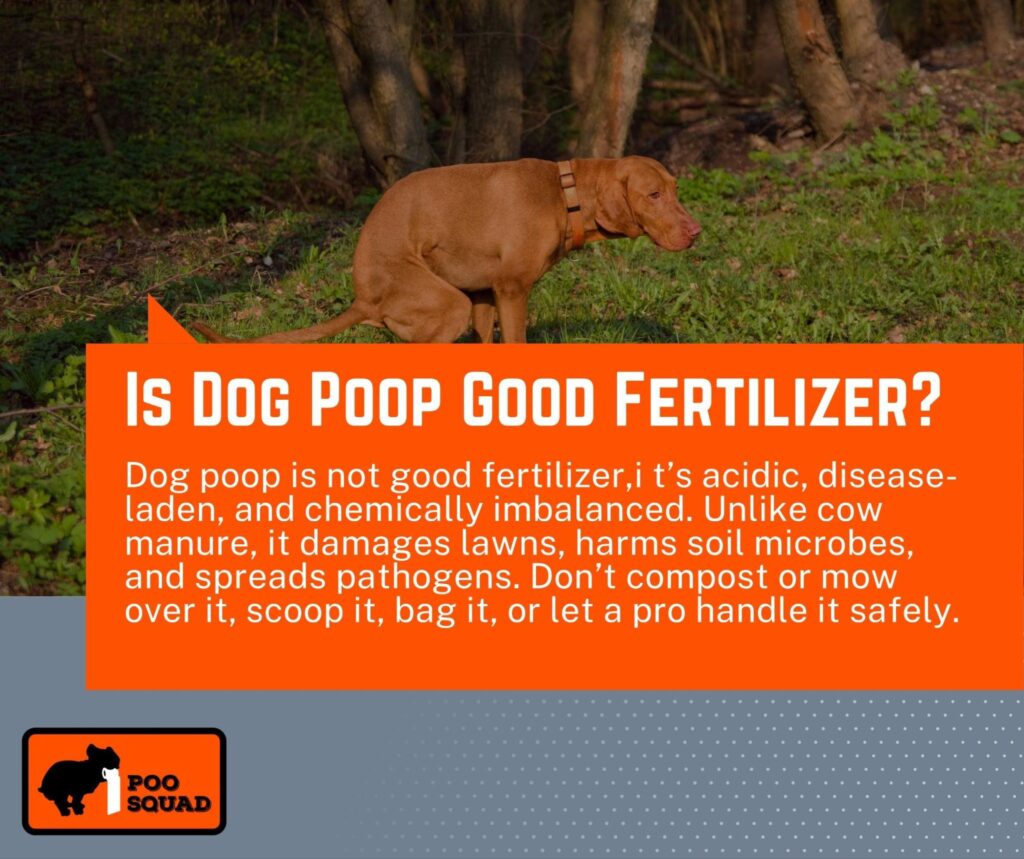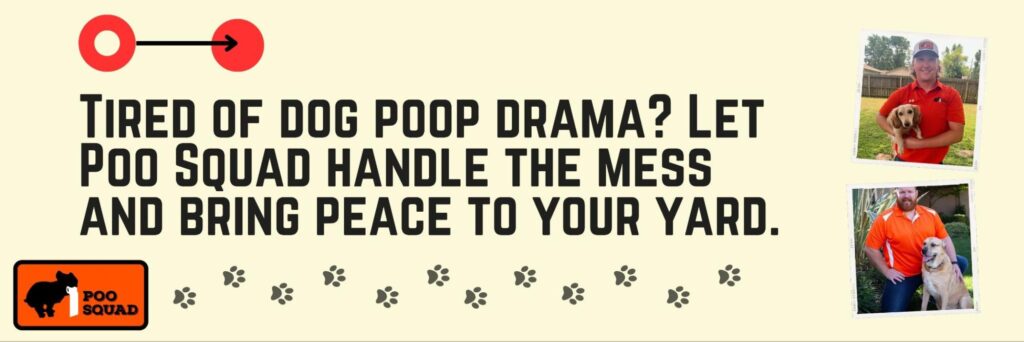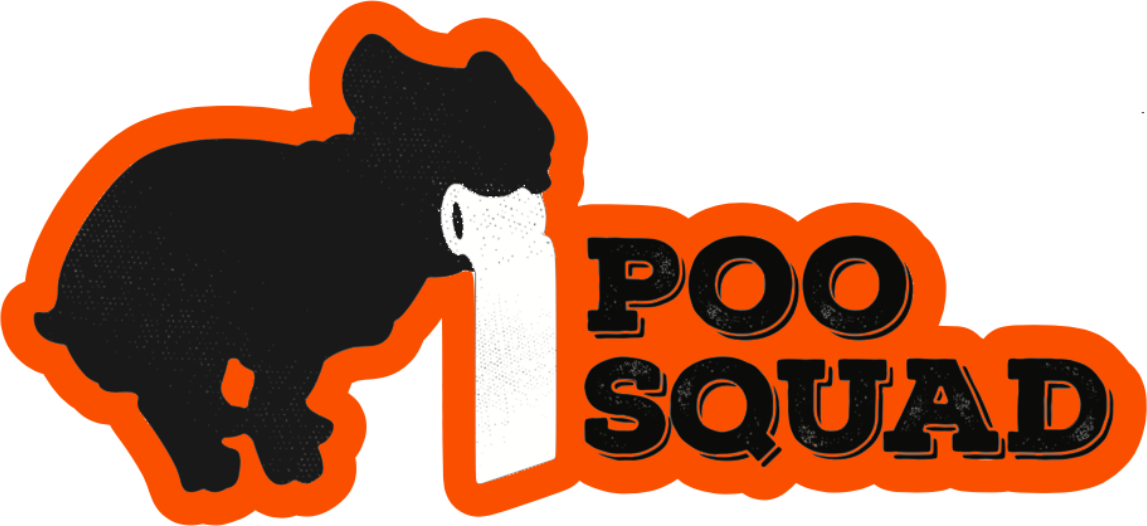Dog poop is not good fertilizer,i t’s acidic, disease-laden, and chemically imbalanced. Unlike cow manure, it damages lawns, harms soil microbes, and spreads pathogens. Don’t compost or mow over it, scoop it, bag it, or let a pro handle it safely.

You love your lawn. You walk your dog. So when someone says “just leave the poop,it’s natural fertilizer,” it sounds… almost believable.
But that myth?
It’s quietly destroying yards, gardens, and even your soil’s health.
Dog poop isn’t just “waste”,it’s a toxic blend of protein-heavy acid, ammonia, and bacteria that can scorch grass, spread disease, and destabilize your soil’s pH. And if you’ve been mowing over it or composting it with kitchen scraps,this guide is your wake-up call.
We’ve cleaned thousands of yards,and seen exactly what dog waste does when left behind or misused. That’s why we offer more than just scooping. Our team log poop health anomalies, sanitize tools between visits, and help homeowners like you avoid burned lawns and bacterial nightmares with every cleanup.
Curious why dog waste isn’t safe to compost?
Wondering what causes those yellow lawn spots?
What really happens when rain washes poop into your veggie bed?
We’re breaking down the science, busting the myths, and giving you the clean facts on how to keep your lawn healthy,and your family safer.
Is Dog Poop Technically Fertilizer?
Just because it came out of an animal doesn’t mean it’s good for your garden.
Dog poop doesn’t work like cow manure. Cows are herbivores, grazing all day on grass and plants,so their waste breaks down cleanly and adds nutrients to soil. Dogs, on the other hand, are omnivores. Their diet is packed with protein, fat, and processed ingredients, which makes their waste chemically unbalanced and full of compounds that plants struggle to process.
If you’re thinking in terms of NPK (nitrogen, phosphorus, potassium),the standard nutrients found in fertilizers,dog poop doesn’t hold up. It’s loaded with nitrogen, but not in a helpful way. This kind of nitrogen overwhelms the soil, scorches grass, and causes those ugly yellow-brown patches across the yard. Think of it like dumping too much hot sauce on a dish,it doesn’t make it better, it just ruins it.
And then there’s the salt. Dog poop contains salts and acids that throw off your soil’s pH levels. Over time, this kills off helpful microbes and hardens the earth.
You’ll start noticing compacted soil that drains poorly, smells weird after rain, and simply won’t grow anything healthy,especially if you’re planning to use that space for flowers or vegetables.
So, can it kill your grass?
Absolutely. Between the high ammonia levels and acidic pH, it doesn’t just harm,it slowly poisons the very soil you’re trying to improve.
If you’re already seeing burned spots and wondering what’s behind them, take a walk around your yard. You might not need a soil test, you might just need a better cleanup system.
The Hidden Health Risks in Dog Waste
Even if you’re not using dog poop as fertilizer, just leaving it in the yard invites a cocktail of pathogens you don’t want anywhere near your home. We’re talking E.coli, salmonella, roundworms, hookworms, the kind of microscopic parasites that quietly survive in soil for weeks or even months.
These germs don’t just stay where the poop landed.
Kids playing in the yard?
Pets digging in flower beds?
Gardeners planting tomatoes for summer?
If there’s been uncollected waste, everyone’s exposed. Bare hands, shoes, garden gloves,it doesn’t take much for parasites to hitch a ride back inside.
What if it makes my kids or pets sick?
That’s not paranoia, that’s a real concern. Roundworm eggs, for example, can survive in soil and remain infectious long after the poop is gone. A single gram of dog waste can contain millions of coliform bacteria. It’s not just gross,it’s dangerous.
And yes, even plants can suffer.
Can it harm trees or vegetables?
The answer is yes, especially if you’re growing anything edible. The bacteria and parasites can be taken up by root systems or splash onto leaves during watering or rainfall, putting your family at risk.
Speaking of water,runoff is a huge issue. During storms, uncollected dog poop can wash into storm drains and local streams, releasing nutrients and pathogens that disrupt aquatic ecosystems. It’s one of the silent reasons urban waterways struggle with pollution, algae blooms, and fish die-offs.
The longer dog waste sits, the more damage it does. That’s why many homeowners choose waste removal services that don’t just scoop and run, they sanitize tools, send gate-closed photo reports, and log poop health issues after every visit.
Can You Compost Dog Poop Into Safe Fertilizer?
Technically, yes,you can compost dog poop. But before you toss a pile of it in your backyard bin, there are a few things you should know.
Composting dog waste safely requires sustained temperatures of at least 140°F for several days. That’s the threshold needed to kill off pathogens like roundworms, hookworms, and harmful bacteria. Most backyard compost systems,especially the plastic tumblers or wire bins,don’t reach those temperatures consistently, if at all.
Can I just mix it with regular compost?
Unfortunately, no. Adding dog poop to kitchen scraps or leaf mulch doesn’t dilute the danger. It spreads. Unless you’re using a high-heat composting system designed specifically for pet waste (and you monitor it like a hawk), you’re creating a breeding ground, not a fertilizer pile.
Does freezing kill the parasites?
Not reliably. Parasite eggs can survive cold temperatures and thaw out ready to infect. So unless you’re planning on torching the frozen clumps with a flamethrower, that strategy’s off the table.
So what about commercial compost products?
There are a few that claim to safely process pet waste, but even the EPA warns: compost made from dog poop should only be used on non-edible plants,think trees, shrubs, or ornamentals. Never near herbs, vegetables, or anything that touches your dinner plate.
There’s also the issue of smell, pests, and long decay time. Dog poop doesn’t break down as quickly as you think, and until it does, you’re basically nurturing a fly-and-odor factory.
All things considered, most people aren’t looking for a science experiment in their backyard. If you’re trying to keep your yard clean and safe, there are simpler options,like setting up professional service that removes waste weekly, sends dog health updates, and even offers yard sanitization treatments to reset your soil.
What Happens If You Leave Dog Poop in Your Yard?
Leaving dog poop in the yard doesn’t just make things look messy,it quietly wrecks your lawn over time.
First, there’s the obvious: grass burns. Dog waste has an ultra-high nitrogen content, which might sound good in theory, but in reality, it overloads the soil.
The result?
Those all-too-familiar brown and yellow patches. The longer it sits, the worse the salt buildup gets, compacting soil and choking off healthy grass growth.
Then comes the smell. Unlike cow manure, which breaks down more cleanly and is often composted for gardens, dog poop sticks around. Literally and figuratively. The smell clings to wet soil, mulch, even patio furniture if you’re downwind on the wrong day.
Will it smell forever?
No, but in shaded or damp areas, it can linger for weeks,especially after rain.
And it’s not just unpleasant. It’s an open invite for flies, beetles, and rodents. Dog poop provides the perfect breeding ground for pests that track bacteria through your garden and into your home. If you’re growing tomatoes or herbs nearby, now’s a good time to rethink their location.
One myth that refuses to die is the “I just mow over it” routine. Unfortunately, mowing doesn’t solve anything. In fact, it’s one of the fastest ways to spread bacteria, parasites, and disease across your entire lawn. Your mower blades won’t sanitize as they spin,if anything, they aerosolized the mess. And yes, your shoes track it inside.
As for contamination risk, especially with vegetables?
When dog poop sits near garden beds, runoff can carry pathogens into the soil. The result: infected produce that may look just fine on the outside, but carries microscopic risks that no rinse will remove.
If the goal is a healthy, functional outdoor space,whether that’s for your family, your garden, or just some weekend grilling,dog waste has no place lingering. That’s why many homeowners include sanitation treatments alongside regular scooping. It’s not just about what’s visible. It’s about restoring trust in every square foot of your yard.

Why Elite Pet Waste Pros Say ‘No’ to the Fertilizer Myth
There’s a reason the best pet waste professionals don’t pitch dog poop as fertilizer, it’s not just bad science, it’s a disservice to the very people we’re trying to help.
If dog poop were a usable resource, we’d be the first to turn it into something valuable. But every day on the job tells a different story. From the ammonia-burned grass to the distressed parents emailing us about sick kids and barefoot mishaps, the message is clear,poop isn’t a product. It’s a problem that needs solving.
5 Myths About Dog Poop as Fertilizer, Busted
Some myths die hard. Others leave brown spots all over your yard. Let’s clear the air, literally, and debunk the most common misconceptions people still believe about dog poop and its place in the garden.
1. It’s just like cow manure.
Nope. Not even close. Cow manure comes from herbivores and breaks down into plant-friendly nutrients. Dog poop, on the other hand, is loaded with protein waste, ammonia, and pathogens. It’s chemically harsh, and biologically risky.
2. It helps the grass grow.
More like it helps your grass die. High nitrogen content may sound like fertilizer gold, but in this case, it burns your lawn, causing dead patches, yellow streaks, and long-term soil damage.
3. I can compost it at home.
Unless you’re running a high-heat compost system with a thermometer and a degree in microbiology, don’t. Most backyard composters can’t hit the 140°F needed to kill parasites and bacteria.
The result?
You’re cultivating disease, not nutrients.
4. Only rich people hire pooper scoopers.
Tell that to the exhausted mom juggling soccer practice, a conference call, and a Labrador with GI issues. Hiring helps with time, health, and sanity. And yes, it’s more affordable than you’d think.
5. Hiring a scooper means I’m lazy.
Nah. It means you’re smart. Dog waste removal done right doesn’t just make your yard look better,it prevents bacterial runoff, protects your soil, and stops the spread of parasites. That’s not lazy. That’s responsible.
If you’ve got a friend who still believes one of these myths, do them (and their backyard) a favor,send this their way. They’ll thank you next spring when their grass is green, their tomatoes aren’t questionable, and their weekends are actually free.
If Dog Poop Isn’t Fertilizer… What Should You Do With It?
Alright, so if tossing it in the flowerbed is off the table, what’s the eco-friendly move?
There are smarter, safer ways to dispose of dog waste without harming your yard, your family, or the environment.
Bag it and Bin it (Properly)
Most cities allow dog waste in regular trash as long as it’s double-bagged in biodegradable or designated pet waste bags. Check your local sanitation rules, some cities even offer pet waste bins in parks and public spaces.
Compost, But Only With the Right Setup
There are dog-specific compost bins on the market, but they’re only safe for non-edible plants like shrubs and ornamentals. They require aerobic digestion, special enzymes, and lots of heat. This isn’t your average backyard tumbler.
So, can it be diluted with other compost?
Not really. Mixing dog poop into regular food scrap compost risks cross-contamination unless you’re operating a certified high-heat system.
And does freezing kill parasites?
No. Cold slows decay but does nothing to eliminate the pathogens.
Methane Digesters
A few experimental communities are exploring methane digesters that convert dog waste into energy. It’s not widespread yet, but it’s exciting to see forward momentum in sustainable waste tech.
Can Dog Poop Be Incinerated?
Technically, yes,but not in your backyard fire pit. Commercial-grade incinerators are sometimes used by large kennels or city waste programs. If your city offers this, it’s likely handled through municipal pet waste stations.
Let a Professional Handle It
Teams that sanitize tools, track dog health, and never leave waste behind (or in your bins) are offering far more than a clean lawn. They’re offering prevention, peace of mind, and time you can’t get back.
So if you’re looking for a clean, smart, and eco-minded way to deal with it all,this is where that journey ends (and your weekend begins).
What Homeowners Learned the Hard Way
There’s no shortage of hard-earned lessons when it comes to what people think is natural and what actually works.
One client thought they were saving time and money by leaving waste in the yard to “naturally” fertilize the grass. A few weeks later, their backyard looked like it had been scorched by fire, brown rings, bare patches, and an odor that wouldn’t quit. The fix? Months of soil treatment and reseeding.
Another story sticks with us: a woman came home to a freshly cleaned yard and burst into tears,not out of frustration, but relief. “You have no idea how happy I am,” she said. “I’ve been carrying this guilt for months. I just couldn’t do it myself.” Her mobility issues had made it impossible, and all she wanted was a clean space for her dog to play.
Then there are the families, elderly couples, busy parents, disabled pet lovers,who believed the myth that “natural” always meant safety. Until they learned the science.
The health risks. The environmental damage. And that a little help can go a long way in protecting what matters most.
That’s why it’s not just about scooping poop. It’s about education, sanitation, and peace of mind. And yes, the occasional thank-you video to make it all a little more human.
Should You Use Dog Poop as Fertilizer? The Final Verdict
The short answer? No.
Dog poop doesn’t belong in your veggies, your lawn, or your flowerbeds. Unless you’re running an industrial compost system with high heat and strict safety protocols, it’s not just ineffective,it’s risky.
Between the pathogens, the poor pH, and the environmental consequences, leaving it in your yard (or worse, using it on your plants) is asking for trouble.
Want help staying safe and sanitary?
Let Poo Squad take care of the dirty work,no myths, just clean yards.
Common Poop Fertilizer Confusions
Curious minds have been asking,sometimes in hushed tones, sometimes anonymously,and it’s time to clear the air (and the misconceptions). If you’ve ever wondered these things yourself, you’re not alone.
Can I just bury it in the woods?
You can, but it doesn’t mean you should. Burying dog waste without proper containment still introduces bacteria and parasites into the environment. Depending on where you live, it might even be illegal. And if there are water sources nearby, runoff can carry pathogens straight into streams or wells.
Are there any fertilizers that actually use dog poop?
Commercially? Not really. Most agricultural fertilizers rely on herbivore waste for a reason,it’s safer and chemically compatible with plant growth. Dog poop brings too much risk for too little reward. The regulatory red tape alone makes it a nonstarter for most reputable companies.
Do birds or worms spread it around?
Unfortunately, yes. Birds can peck at exposed waste and spread microbes to nearby surfaces. Worms may break it down in soil, but they don’t neutralize pathogens. Until dog waste is properly composted at high heat, it’s not something you want anything,or anyone,moving around your yard.
Still have a question? Chances are, someone else has asked it too. But when it comes to what happens after your dog does their business, the safest answer is simple: clean it, bag it, or let professionals scoop it right. Every time.
